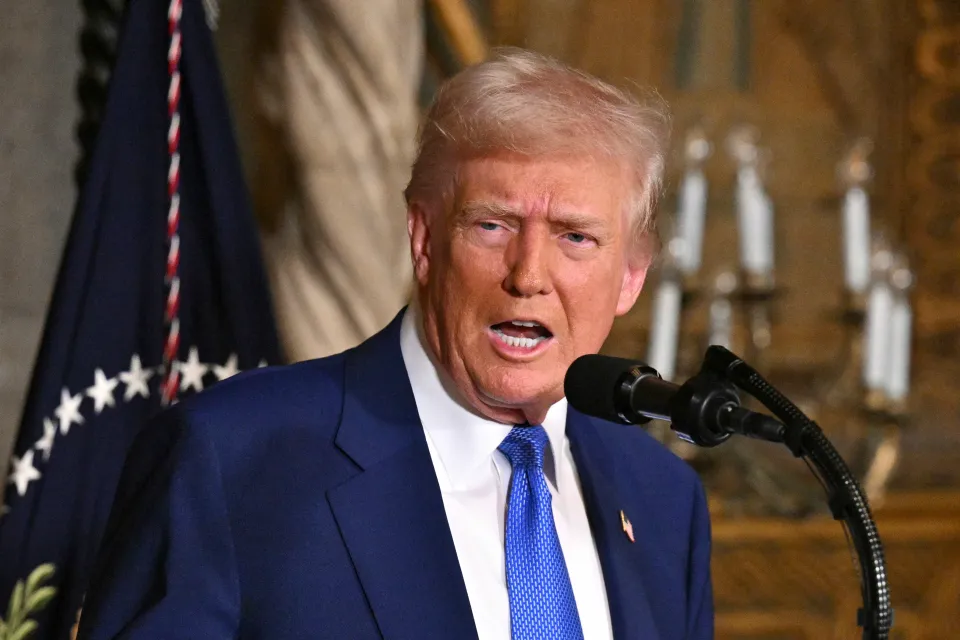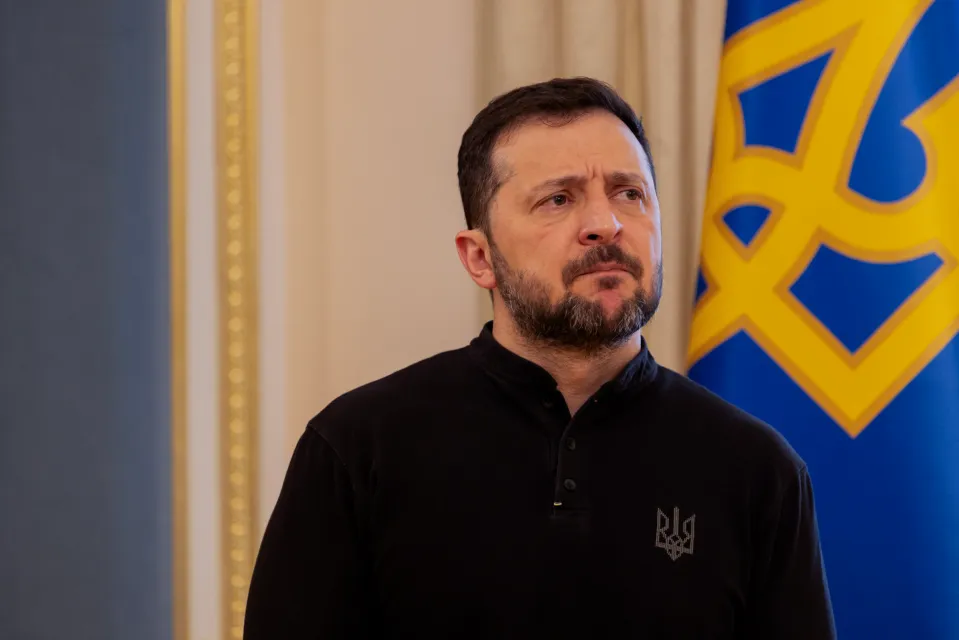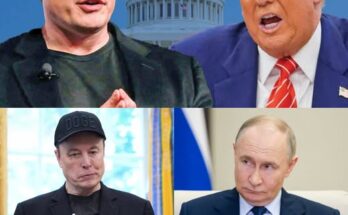Trump BLASTS ‘comedian & dictator’ Zelensky for ‘tricking US into funding unwinnable war’ in blistering Ukraine attack
Trump’s Harsh Rebuke of Zelensky and His Views on the Ukraine War
In his most scathing remarks yet, former U.S. President Donald Trump has doubled down on his views regarding Ukraine and its leader, Volodymyr Zelensky. Trump has been vocal about his belief that Ukraine is fighting an unwinnable war, and he has repeatedly criticized the U.S. government’s financial and military aid to the country. His latest attack—an explosive 232-word statement—left no room for ambiguity: Trump believes only the United States, under his leadership, has the influence and power to end the ongoing war between Russia and Ukraine.

Trump’s Strongest Criticism Yet
Trump’s comments, made on his social media platform, were aimed squarely at Zelensky and the U.S. financial commitment to Ukraine. He referred to Zelensky as a “modestly successful comedian” before accusing him of misleading the U.S. into supporting a war that, in his words, “couldn’t be won.” He further claimed that the war was unnecessary and that Ukraine would never be able to achieve peace without the intervention of “the US and TRUMP.”
Trump also emphasized the financial burden on the United States, stating that “The United States has spent $200 Billion Dollars more than Europe, and Europe’s money is guaranteed, while the United States will get nothing back.” His statement underscored his longstanding belief that European nations are not contributing their fair share to Ukraine’s defense while the U.S. continues to foot the bill.
The Financial Debate: Has the U.S. Given Too Much?

Trump’s claim that the U.S. has spent $200 billion more than Europe is a bold assertion. While the exact numbers vary depending on the source, the United States has indeed provided substantial aid to Ukraine. The Biden administration has allocated billions in military assistance, economic support, and humanitarian aid. However, European nations, collectively, have also provided significant resources to Ukraine, including military equipment, economic relief, and asylum for refugees.
Trump’s remarks raise important questions about the sustainability of U.S. aid and whether it should continue at its current pace. His comments resonate with a faction of Americans who believe that domestic priorities should take precedence over foreign aid, especially when it involves prolonged military conflicts. On the other hand, critics argue that failing to support Ukraine could embolden Russia and destabilize the region further.
Trump’s Attempt to Negotiate Peace with Putin
Beyond financial concerns, Trump has made it clear that he believes he is the only leader capable of brokering peace between Russia and Ukraine. He has repeatedly suggested that he would be able to end the war “within 24 hours” if he were in office. Though Trump has not detailed how he would accomplish this, he has hinted at direct negotiations with Russian President Vladimir Putin.
Trump’s approach to diplomacy with Russia has always been a contentious topic. During his presidency, he maintained a complicated relationship with Putin, often expressing admiration for the Russian leader while also imposing sanctions on Russia. His critics argue that his stance is too lenient toward the Kremlin and that any peace deal he negotiates would likely favor Russian interests over Ukraine’s sovereignty.
On the other hand, Trump’s supporters believe that his non-traditional approach to foreign policy—one that emphasizes deal-making over prolonged conflicts—could be the key to ending the war. Whether or not his claim of negotiating peace within 24 hours is realistic remains debatable, but his confidence in his ability to bring both sides to the table is unwavering.
Zelensky’s Response and Ukraine’s Position
In response to Trump’s comments, Ukrainian President Volodymyr Zelensky has remained steadfast in his country’s commitment to resisting Russian aggression. While he has expressed gratitude for U.S. support, he has also urged the international community not to waver in its backing of Ukraine.
Zelensky has argued that Ukraine is not merely defending its own borders but also standing as a shield for European democracy. He has also dismissed claims that Ukraine has tricked the U.S. into an unwinnable war, instead emphasizing that Ukraine had no choice but to defend itself against an unprovoked invasion.
As the war continues, Ukraine has increasingly relied on Western military aid, including tanks, long-range missiles, and air defense systems. Trump’s remarks raise concerns in Kyiv about what future U.S. support might look like if he were to return to office. If Trump were to cut or drastically reduce aid to Ukraine, it could significantly impact Ukraine’s ability to continue fighting.
The Political Ramifications in the U.S.
Trump’s remarks have ignited debate among American politicians, with Republicans and Democrats taking starkly different positions on the issue.
Among Republicans, opinions are divided. Some, particularly those aligned with Trump’s “America First” agenda, agree that U.S. involvement in Ukraine is excessive and should be reevaluated. Others within the party, including traditional conservatives who view Russia as a global threat, believe continued support for Ukraine is necessary to prevent further Russian expansionism.
Democrats, on the other hand, have largely condemned Trump’s remarks. They argue that his rhetoric undermines U.S. credibility and weakens alliances. The Biden administration has maintained that supporting Ukraine is a strategic priority that serves American interests by deterring future aggression from adversarial nations.
Global Reaction and NATO’s Role
Internationally, Trump’s remarks have also caused ripples. European leaders have expressed concerns about the future of NATO support for Ukraine, particularly if Trump were to return to the White House. Some worry that Trump’s stance could encourage Putin to prolong the war, anticipating a more favorable deal under a potential Trump presidency.
NATO officials have reiterated their commitment to Ukraine, emphasizing that the war is not just about Ukraine but about the security of Europe as a whole. While some European nations have increased their military spending and aid to Ukraine, many still rely heavily on U.S. leadership in coordinating efforts against Russian aggression.
What Comes Next?
As the 2024 U.S. presidential election approaches, Trump’s stance on Ukraine will likely be a major campaign issue. If he secures the Republican nomination, his position on the war could shape the future of U.S. foreign policy. His repeated claims of being able to negotiate peace swiftly will be scrutinized, and voters will have to decide whether they believe in his ability to deliver on those promises.
For Ukraine, the uncertainty surrounding future U.S. aid creates challenges in military planning. While Ukraine continues to receive support from the Biden administration, the prospect of a major shift in U.S. policy looms large.
For now, the war rages on, with no immediate end in sight. Trump’s latest remarks add another layer of complexity to an already intricate geopolitical conflict, reinforcing the deep divisions on how best to approach the war in Ukraine.


